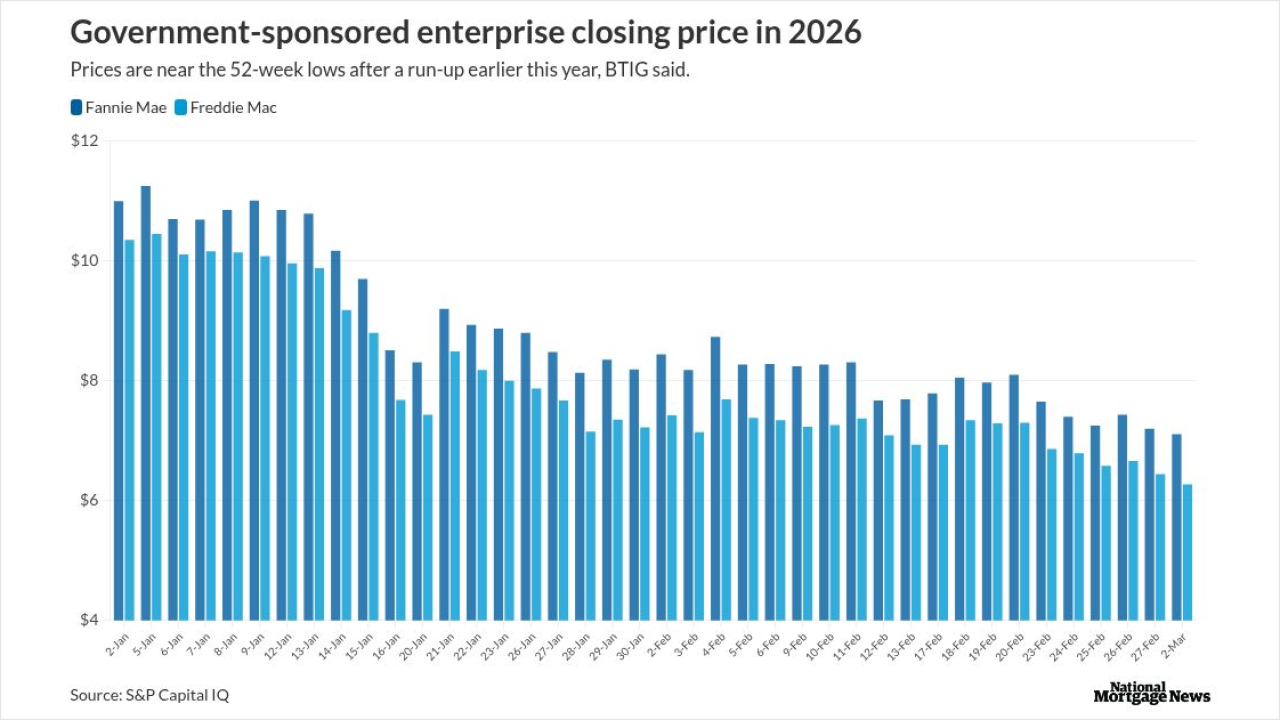
WASHINGTON — A federal agency's plan to tighten membership rules for Federal Home Loan banks would hurt community banks and credit unions — and could endanger the financial system, according to a broad array of stakeholders, including state regulators, lawmakers and institutions.
The Federal Housing Finance Agency issued a proposal in September that would for the first time institute ongoing membership requirements, forcing institutions to keep mortgage assets on their books or risk being kicked out of the system.
But even fellow regulators said the plan is deeply flawed.
The "revisions to membership requirements, as proposed, would have a detrimental effect on FHLB members and the FHLB System as a whole," wrote John Ryan, the president and chief executive of the Conference of State Bank Supervisors, which represents state regulators.
"Specifically, the FHFA's proposal to impose ongoing mortgage threshold asset tests on new and current members could lead to community banks unnecessarily losing a stable and critical source of funding through termination of their FHLB membership."
At the heart of the debate is the purpose of the Federal Home Loan Bank System. The FHFA's plan is designed to ensure that members remain focused on making mortgages, fulfilling its original purpose of supporting housing finance. But the purpose of the Home Loan Bank System has evolved to also include providing liquidity to members, particularly in times of stress.
"The proposed rule ignores Congress' clear expansion of the FHLBank's mission beyond merely housing finance to one that includes providing liquidity to members," wrote Andrew Jetter, the head of the Federal Home Loan Bank of Topeka.
He was seconded by the Dallas Home Loan bank and others in the system.
The proposal's "narrow focus on housing-related assets appears to be in conflict with the expansive view of the Bank's mission that Congress has expressed through legislation in recent decades," wrote Sanjay Bhasin, the president and CEO of the Dallas bank.
While a mortgage asset test is required to become a member, there is currently no ongoing requirement.
The proposal would require banks and credit unions with less than $1 billion of assets to hold at least 1% of their assets in the form of mortgages in order to stay members of a Home Loan bank. Larger institutions must hold at least 10% of their assets in mortgages to retain membership.
While the bank supervisor group stopped short of calling for the FHFA to withdraw its plan, others were not so cautious. A slew of industry groups called for the agency to completely rethink or scrap the plan, including the Independent Community Bankers of America; the American Bankers Association; Credit Union National Association; CUNA Mutual Group; the National Association of Federal Credit Unions; the National Association of Realtors; and the Mortgage Bankers Association. They were backed by hundreds of individual banks and credit unions, the Home Loan banks themselves and many state associations.
Lawmakers have also joined the chorus. Sixty-eight members of Congress signed a letter in mid-November that urged the FHFA to withdraw the proposal. On the Senate side, 29 senators signed a similar letter in mid-December. The senators noted that banks could be expelled from membership if they cannot meet the "new and unprecedented" mortgage asset tests.
"The consequences are harsh and the terms of the proposed rule are inconsistent with the express terms of the FHLBank Act," the senators said.
Hurting Banks and Credit Unions
Many of the comments suggested the FHFA's plan could cripple banks and credit unions that rely on Home Loan Banks for funding.
"Your agency's proposed rules could fundamentally change how, even whether, our financial institution will remain a member of the FHLB Des Moines," wrote Shelly Reuther, the chief financial officer of New Frontier Bank in St. Charles, Mo. "This is enormously disturbing. We need to know that the FHLB Des Moines can provide funding on a moment's notice as it did in the recent financial crisis."
Moreover, financial institutions would no longer know for sure that they would continue to members of a Home Loan Bank if they fail the asset test, said Luis Massiani, the chief financial officer at Sterling National Bank in Montebello, N.Y.
"I respectfully request that the NPR be withdrawn or, at the very least, that subsequent membership asset holding test be eliminated from the rule," he wrote, referring to notice of proposed rulemaking.
Some regulators also said the plan could create a safety and soundness risk because it would force institutions to keep mortgages on their books at the same time that the Federal Reserve Board is set to begin raising interest rates. The federal banking regulators have been sounding increasing alarms about interest rate risk.
"The proposed requirements are contrary to the safety and soundness efforts currently being put forth by federal and state bank regulators to improve liquidity and to mitigate interest rate risk in the banking system," wrote Richard Riccobono, the director of banks for the Washington Department of Financial Institutions, and the former president of the Seattle Home Loan bank. "At a time when one of the highest concerns by bank regulators is interest rate risk, the FHFA is proposing to require an increase in the amount of long-term assets held by FHLB-member banks."
It's 'Unnecessary'
Many commenters said the FHFA did not prove its case for why the plan was necessary in the first place. The state bank supervisor group said it appeared that the FHFA is trying to crack down on banks that aren't really interested in the mortgage business and sell off their mortgages after being approved for membership, but noted it did not provide any evidence that was taking place.
"There is concern about imposing unnecessary requirements without a really clear understanding of why it is being done. That is the primary issue," Jim Cooper, senior vice president of the state bank supervisor group, said in an interview. "The Federal Home Loan System provided a lot of important funding throughout the financial crisis. The risk of unnecessarily losing that source of stable funding because of a test just seems unnecessary."
Mary Dunn, the deputy general counsel for CUNA, said it did "not believe the proposed changes are warranted or required to meet statutory requirements.
"Moreover, we do not believe the agency has provided sufficient analysis as to why the proposed membership requirements are needed," she wrote.
The ICBA in its comment letter noted that nearly 460 banks and 139 insurance companies failed since 2007.
Yet "no FHLBank suffered one penny of loss from a collateralized advance from a failed member," Ron Haynie, senior vice president of the group, said in an interview. "We question the need for this proposal."
Haynie said the plan could harm a small percentage of institutions that do not pose a risk to the Federal Home Loan banks.
"It is completely the wrong direction at the worst possible time," he said, noting that the housing and mortgage market continue to be a drag on the economy.
Moreover, some fear the FHFA could later make the test tougher, making it even harder for members to stay with a bank. The FHFA suggested in its proposal that it reserves the right to force small members to hold at least 5% of their assets in mortgages.
"This type of unilateral authority creates uncertainty in the marketplace and would create a chill" in relying on the Home Loan banks, said Michael Anderson, the chief legal officer for CUNA Mutual Group.
Jetter at the Topeka bank said members are already required to meet a mission test every time they take out an advance. Advances must be backed by eligible collateral, which includes residential mortgage assets along with small business, small farm, small agribusiness and community development loans, as approved by Congress.
"Therefore, instead of the disruptive and harmful process of involuntarily terminating an institution's FHLBank membership," Jetter says in comment letter, a member cannot receive Federal Home Loan bank advances if it cannot muster the required collateral.
Shutting Out REITs
One particular provision of the FHFA's proposal also drawing heat would phase out Home Loan bank membership for captive insurers over five years. Mortgage real estate investment trusts, such as Redwood Trust Inc. and Two Harbors Investment Corp., own captive insurers that can secure Federal Home Loan bank advances by pledging mortgage collateral just like banks and other Home Loan bank members.
But industry representatives said the agency was overstepping its authority.
"Congress, not the Federal Housing Finance Agency, should make the decision to change the eligibility for membership," wrote Dennis Harwick, president of the Captive Insurance Companies Association.
The group "strongly objects" to the FHFA's "blanket prohibition" on captive insurance firms.
Others agreed that it wasn't the FHFA's call, noting that Congress has consistently expanded membership in the Federal Home Loan Bank System over the years.
"Congress as seen fit over the years to expand rather than limit opportunities to join the FHLB System, originally offered to insurance companies and thrifts," wrote James White, a member of the Des Moines Home Loan Bank's advisory council.
David Stevens, the president of the Mortgage Bankers Association, said the group also opposes the prohibition on captive insurers, arguing that they make the system "stronger" by investing advances into the housing finance market.
He stressed that advances made to captive insurers owned by REITs and independent mortgage banks are secured financings and significantly overcollateralized with mission-centric collateral.
"Prohibiting captive insurers would undermine the mission of the System and significantly harm the capital position and future business of several individual Banks," Stevens wrote.



